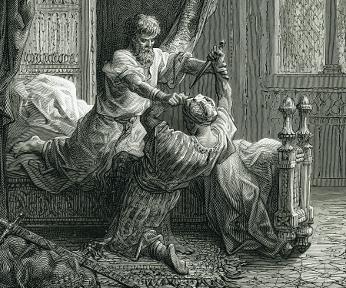Hashish and Assassination April 24, 2016
Author: Beach Combing | in : Medieval , trackback
The Assassins were a well known medieval Shiite sect who delighted in sending out their fida’is (assassins) to kill enemies with daggers. Our word ‘assassinate’ (already used routinely by Dante), of course, comes from these charming individuals. The etymology of Assassin in Arabic has long been supposed to come from the word for hashish (Hashshashin were ‘hashish users’). This was established by Silvestre de Sacy in 1818 and has been little questioned since, particularly among ‘popular’ historians. The problem with the Assassins as hashish eaters or smokers is that the job and the recreational habit have little connection, and are perhaps inimical to one another. Here is Charles E. Nowell in 1947 in a fine early article on the group.
The effect hashish has on the brain and the nervous system depends on the amount that is taken. A small dose will act as a refresher and will increase the staying powers of the user. A larger portion acts as an intoxicant and gives courage, so that reckless acts seem easy to perform. Still more of the drug will raise the taker to a pitch of emotion that drives him insane and makes him a homicidal maniac.
None of these three states are particularly compatible with the art of effective assassination save perhaps the ‘refresher’. The fida’i had to insinuate his way into the company of the important man he would kill. Having a stoner’s eyes and carrying an axe would not further that end when bodyguards were everywhere. So what is the hashish about?
Well, there is a legend, first found in Marco Polo, that the fida’i were convinced to kill by the following ruse (another post another day). They were drugged and taken to a paradise of women, music and delicious foods. After a number of days in this place they were removed and told that the only way they could return to the paradise was by killing for their master and dying: fida’i rarely survived missions. This, though, has the feel of a western misunderstanding of the Islamic idea of a warrior receiving his just deserts in paradise (desserts if you include the sherbert): in terms that Christianity, of course, would have disapproved.
Another possibility is that de Sacy got things wrong two hundred years ago. It is striking that the knowledgeable William of Tyre (obit 1186) said that neither Christian nor Muslim knew the meaning of the word. Certainly by the twelfth century the Assassins were connected with hashish, but perhaps that was a coincidence in sound: to call someone a hashish smoker in the medieval Middle East was as derogatory, as it would be to call a medieval Christian a drunk. The label then may have come from the enemies of the Assassins of which there were, of course, many.
So what does the word really mean? The initial leader of the Assassins was Hassan: could they simply be the men of Hassan? Another suggestion has been that it relates to ‘asas’ the foundation of faith. The question is an open one: drbeachcombing AT yahoo DOT com
30 April 2016: Bruce T writes As best as I can surmise, the term Assassin was used as a slur against the Nizari order who were protecting the claim of legitimate head of the Fatimid Caliphate who was hiding in one of the orders fortresses in Persia. “That bunch crazy of stoners” would be today’s term. Ironically hashish wasn’t being smoked in the Levant at the time. That little discovery seems to have been made on the steppes and brought by the Turks and Mongols.The people of the Levant seemed to have eaten the stuff until the latter two groups overran the region.


